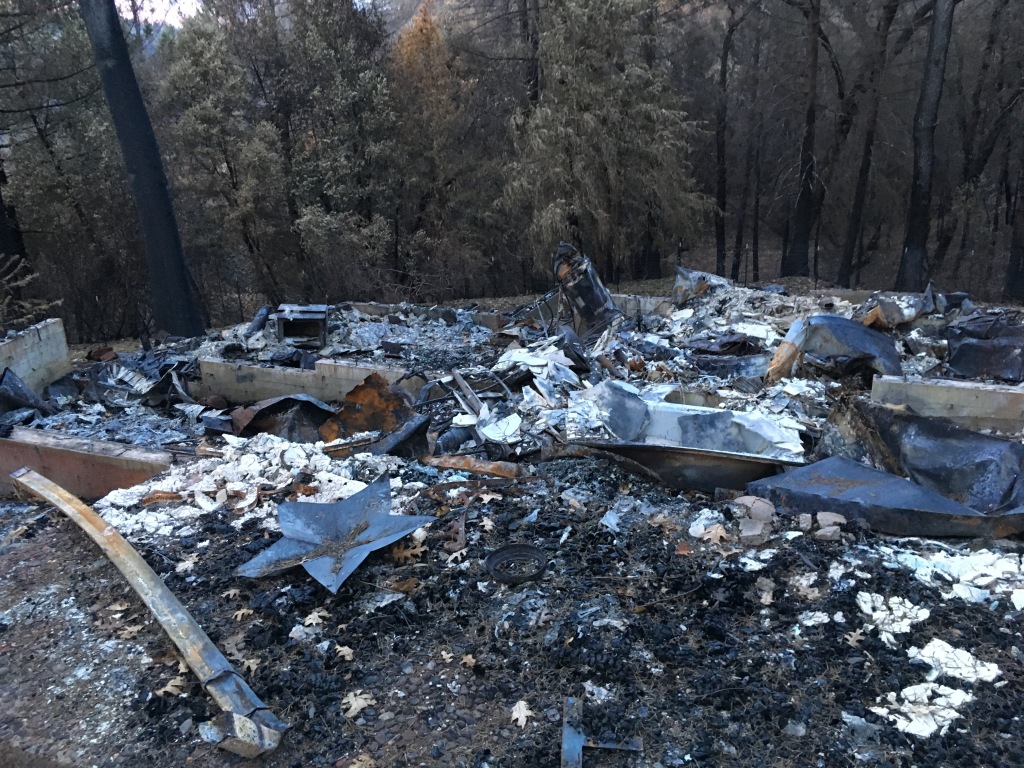Navy veteran Jim Davis saw an ominous sky as he headed out to the woodwork shop at his home in Paradise one morning in November 2018. “A really strange cloud,” he said.
Davis sensed immediately that it soon would be raining fire, not water. He packed up what he could, then quickly left his property.
“We headed out and thought we were getting out early,” Davis said. “Even so, it took us five hours to get out. You can understand why people died.”

The A-frame cedar home, which he’d financed through the California Department of Veterans Affairs’ (CalVet) Home Loan Program 22 years earlier, burned to the ground later that day. The Camp fire devastated the town of Paradise and much of the surrounding area. It killed 85 people. It destroyed or damaged nearly 14,000 homes and more than 500 businesses on its way to making 2018 the deadliest and most destructive wildfire year in the annals of California.

Of the homes destroyed or damaged by wildfires throughout California in 2018, roughly 60 of them were or are owned by veterans who, like Davis, financed them through CalVet. Of those 60, 35 were Camp fire losses insured through CalVet. Some, like Davis’ home, endured total losses. Others could be repaired, including those that received only smoke damage. Rebuilding always is an emotionally painful process that also includes finding temporary housing, replacing personal belongings and replacing vital documents lost in the blazes.
Davis returned to his property a few weeks ago, seeing it again for the first time since it was cleaned up after the fire. There wasn’t much to see. His home and everything in it, gone. His woodworking shop and everything in it, gone. The forest that once nestled them, charred.

To date, only 14 of CalVet’s Camp fire victims have said they will rebuild. Now in his 70s, you can count Davis among those who won’t rebuild in Paradise. But, he said, the process of moving on was made more bearable by his relationship with CalVet. Davis praised the service he received from Steve Torrao, Associate Governmental Program Analyst in CalVet’s Farm and Home Loans Division.
“My (CalVet mortgage) was nearly paid up,” Davis said. “I owed maybe $3,000 or $4,000 on it. I’d had other loans and always liked dealing with CalVet. I can’t speak highly enough of them.”
Torrao worked with Davis to establish property values before and after the fire, and Davis received enough of an equity settlement to buy another place near Weed, California.
“The CalVet folks really went out of their way to help,” Davis said. But he cautions that resolving claims is never quick and easy, and that in his case, CalVet insurance protected only his home and structures. He maintained other homeowners’ insurance to cover his personal belongings. He knows now that documenting what he’d lost isn’t easy to do when everything goes up in smoke.
“I had to get pictures of what the place looked like before from friends,” Davis said. “I should have taken pictures of the house and had it on a Google drive (or Cloud).”
In fact, that is his best advice to others – CalVet mortgage holders or not – who live in high-risk fire areas: Document your belongings electronically and store the information where it can be accessed for claims as necessary. Store vital paperwork in safety deposit boxes, or fireproof safes. Documents to protect or copy include passports, annual tax returns, Social Security cards, DD-214s, wills, birth and marriage certificates, property deeds, auto pink slips, and other vital records.
Any of those practices would have expedited Davis’ claim, he said. But compared to the families who lost loved ones, he feels blessed. The day he returned to see his property, Davis also stopped by to see his brother who now lives in Chico and also lost his home to the Camp fire, as did another brother.
“It hasn’t ruined my life,” Davis said. “I’m heading to my brother’s place today. Life is good.”
CalVet home loans offer competitive interest rates with low or no down payments. Most loans include the CalVet insurance program that has below-market rates with low deductibles. For example, the fire and hazard coverage deductible is $250, with a $500 deductible for flood and mudslide claims. The loans utilize the VA Loan guarantee by the U.S. Department of Veteran Affairs and are available to nearly any veteran wanting to buy a home in this state.
Fire readiness
Homeowners in fire-prone areas can lessen their risk by heeding the suggested 100 feet of defensible space around their homes. The homes with more fire-resistant materials – including tile or composition roofing – have a better chance of surviving as well.
CalFire offers plenty of advice on how to protect your home as the next fire season ramps up. It provides information on creating defensible space and also “hardening” a home with ember-resistant materials. It also offers a checklist of fire protection tips including how to store firewood and other combustibles. And it details steps for creating a wildfire plan that includes escape routes, rendezvous points, and communications with family or friends in the event of a wildfire.
